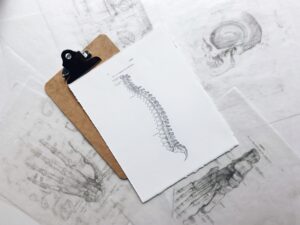Your spine is comprised of bones (vertebrae) that are cushioned by discs. The discs are rounded like small pillows and have a tough outer layer (annulus) surrounding the nucleus. These discs are found between each vertebral bone in the spinal column and act as shock absorbers for the vertebral bones.
Herniated Discs
Sometimes, a fragment of the disc nucleus gets pushed into the spinal canal via a rupture in the tough outer layer. When this happens to any of your spinal discs, the disc is said to be herniated, slipped, or bulged. Herniated discs are often in the early stages of degeneration.
Due to the limited space in the spinal canal, a herniated disc will eat into the space for the spinal nerves. The displaced disc presses on spinal nerves and is known to produce pain which can be severe and disabling. Herniated discs are not reserved for a specific point on the spine and may develop at any point. However, herniated discs are more common in the lower back and the neck (lumbar and cervical spine), and pain is felt depending on the affected part of the spine.
What Causes a Herniated Disc?
Whereas a single excessive strain or injury to your spine may lead to a herniated disc, discs often degenerate with increasing age, and ligaments weaken. This degeneration makes older persons more likely to rupture a disc even with minor exertion or twisting spine movement. Some families may also have a genetic susceptibility to herniated discs and are therefore at higher risk.
How Do Herniated Discs Present?
As you may rightly infer, symptoms will vary significantly as a function of the spinal position of the herniated disk and the size of the hernia. Sometimes, the hernia may not press on the spinal nerves, and you will only notice a dull backache or not have any pain. When the hernia presses on a spinal nerve, you may experience pain, numbness, pins, and needles (paraesthesia), or weakness at the point the nerve innervates.
In the ideal situation, a herniated disc is followed by episodes of low back pain or a long history of intermittent periods of lower back pain. If you have a herniated lumbar spine disc, you may feel pain, tingling, burning, and numbness that often radiates from your buttock into the leg and foot. Often, only one leg or foot will be affected. You may feel a sharp electric-like pain that may increase severity while walking, sitting, or standing. You may also observe that when you try to straighten your affected leg, the pain worsens.
The leg pain may be accompanied by lower back pain, but the leg pain is often more severe than the back pain. When you get a herniated cervical disc, your symptoms will occur on the neck. These symptoms may include a dull or sometimes sharp pain in your neck or between your shoulder blades. The pain may also radiate into your arm to the hands and fingers. Sometimes, you may also experience tingling or numbness in your arm or shoulder. Moving your neck or holding your neck in certain positions may worsen the neck pain.
Seeking Help For a Herniated Disc
A majority of herniated discs do not require surgery to treat. When experiencing symptoms of herniation on either your lumbar or cervical spine, you should:
- Try to reduce physical activity or limit it for at least three days. However, bed rest is not recommended
- Non-surgical treatments at this time are encouraged, including going to a chiropractor
Symptoms should improve with time, and you may feel better in a few days or weeks. If symptoms fail to improve, you may decide to seek medical attention. A medical practitioner often asks for a magnetic resonance image (MRI) of your spine to view the herniated disc. Whereas your doctor may recommend surgery, it should only be considered when all things fail. Surgical risks increase with advancing age, overall health, and other issues. Since most people who experience herniated discs are advanced in age, surgery may be a risky option.
Non-Surgical Treatment Modalities
Non-surgical treatments should be your go-to choice. Other than reducing physical activity and taking painkillers, you may seek the services of a chiropractor. A chiropractor is trained to help alleviate the symptoms of pain associated with a herniated disc. Through chiropractic manipulations, depending on the position of your herniated disc, a chiropractor can alleviate neck and back pain. The latter improves your quality of life and reduces your reliance on pain medications that may have harmful side effects.
A chiropractor can realign your spine and even improve healing by inducing neuropeptides, which are the body’s painkillers. A badly herniated vertebral disc can heal without surgery. Consider surgery as a last option since sometimes, the risks may outweigh the benefits. Reach out to us today at 205-637-1363 to get your much-needed relief from herniated spinal discs.








